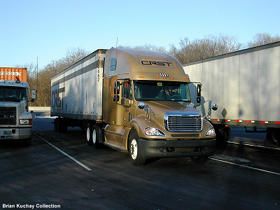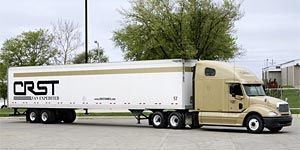

Follow along as we guide you through each of the company-sponsored training programs. You'll be able to:
Once you're finished, we'll generate a report showing all of your information so you can easily compare the programs.
Everything will be saved, so you can return here anytime to continue with your research without having to start over.
You will also have the option of sharing your reports, and viewing reports shared by other members of our community.
It's really simple and it's even kinda fun, so give it a try!




While this depends on which of the 30 schools you attend, most CDL schools in the CRST network will assist you in obtaining your CDL permit.
Yes. All drivers need a passport for travel into Canada.
A HazMat endorsement is required (CRST pays all HazMat certification fees). While not required, CRST also operates double-trailers for some dedicated and regional positions so a doubles/triples endorsement is a good idea.

Since both a passport and a HazMat certification are required, we recommend you begin this process early. Before heading to your CDL school, begin the paperwork process to obtain your passport and while studying for your CDL permit tests, expect to take the exams for the HazMat endorsement.
Since CRST does run double/triple operations, it's also a great idea to take the double/triple certification as well to become eligible for future opportunities. We also recommend everyone takes and passes the tanker exams since most people can pass that endorsement through all of their studying on the other endorsement categories.

If you need to obtain your Class-A CDL but lack the funds to do so, CRST offers a company sponsored program and no credit checks are required. CRST will pay for the schooling up front and in return, you'll sign a contract stating you'll stay employed with them for a minimum of 8 months. Students who participate in this program will start at a lower pay scale for the first 6 months as follows:

Once a driver has been collecting a paycheck for 6 weeks, CRST will begin to payroll deduct the cost of transportation to the CDL school unless you provided your own transportation. The DOT Physical / DOT drug and alcohol tests will also be payroll deducted (total cost of both is $100).
Finally, if you required lodging at the CDL school, these costs will also be payroll deducted (generally lodging costs $150 per week). Payroll deductions will never exceed $40 per week for all of these items combined.
No, students will need to supply their own food. During the 4 day company orientation, lunch and dinner is provided.
Initially, all lodging fees are covered. After 6 weeks of employment with CRST, they will payroll deduct the lodging costs. Generally lodging is about $150 per week.

Yes. You may make a prepayment amount of $2,500. This must be paid prior to starting school by way of money order or credit card. In return, you do not have to sign any contract and you will start driving at a higher rate of pay than a contract student.
Under this plan, you do not have to pay the CRST processing fee of $50, for transportation to school, the physical or drug test, or for lodging. You will only need to pay for any CDL permit or licensing fees.
Simply stay employed for 8 months and your obligation will be fulfilled. Contract students will start out at a lower pay scale, but at 6 months their pay will be the equivalent of a "non contract" driver. The reduced pay is as follows:

While some people may not have the option, this is one program that we highly recommend paying for up front if possible. Reason being, you'll save quite a bit of money by paying up front. Not only are the basic expenses covered such as your licensing and permit fees, but CRST will also cover the cost of transportation and lodging expenses, plus start you out at a higher pay rate.
Over the long term, it's not going to matter much either way as you're probably going to be driving for many years making $35,000-$50,000 per year. Also the contractual agreement is only 8 months long, the shortest we've seen so far (most companies are 12 months+). But if you have the money up front to cover the tuition cost of $2,500, it's highly recommended.

